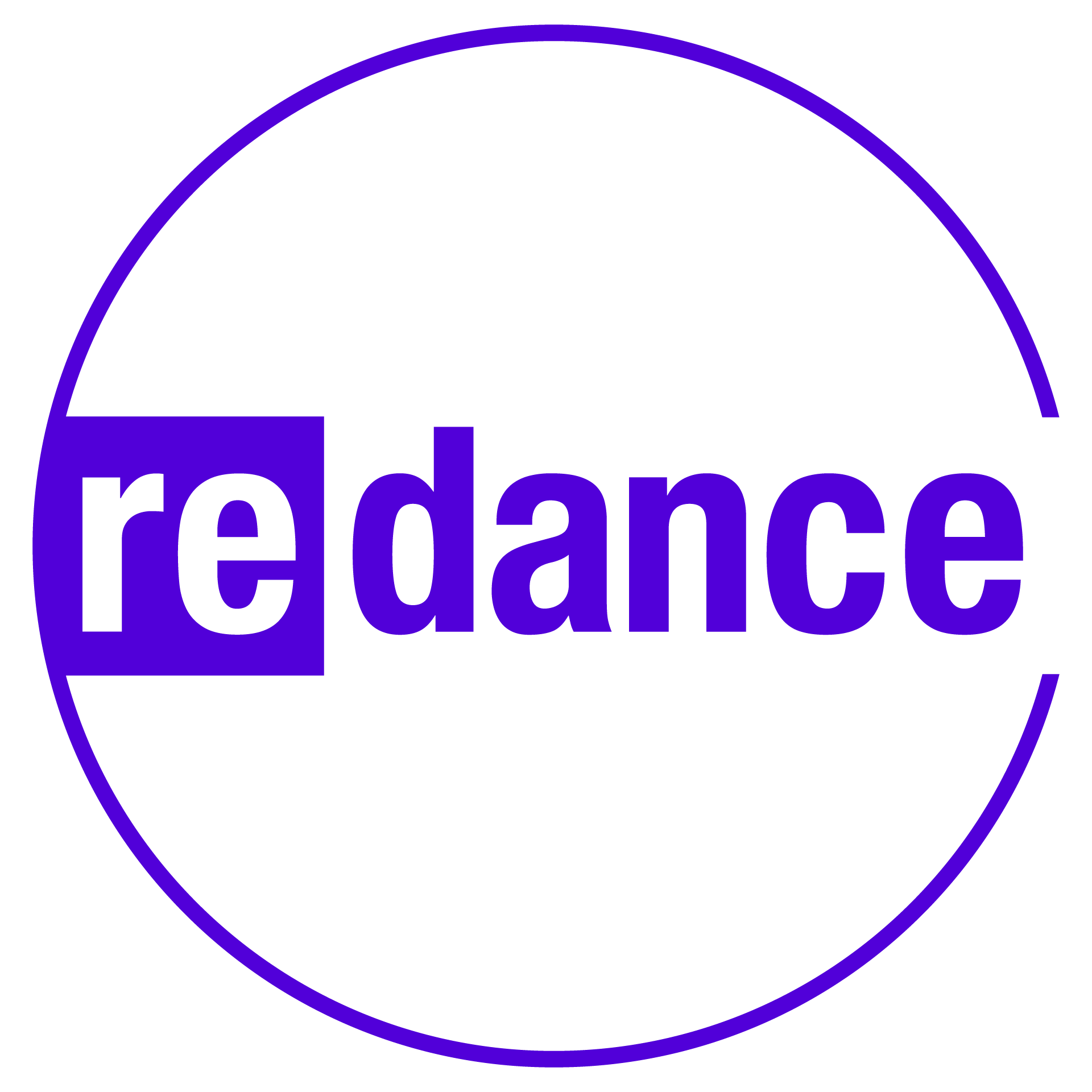Being present where you are: Nina Wollny
interviewed by Katelyn Skelley
Interview date: 25.5.2021
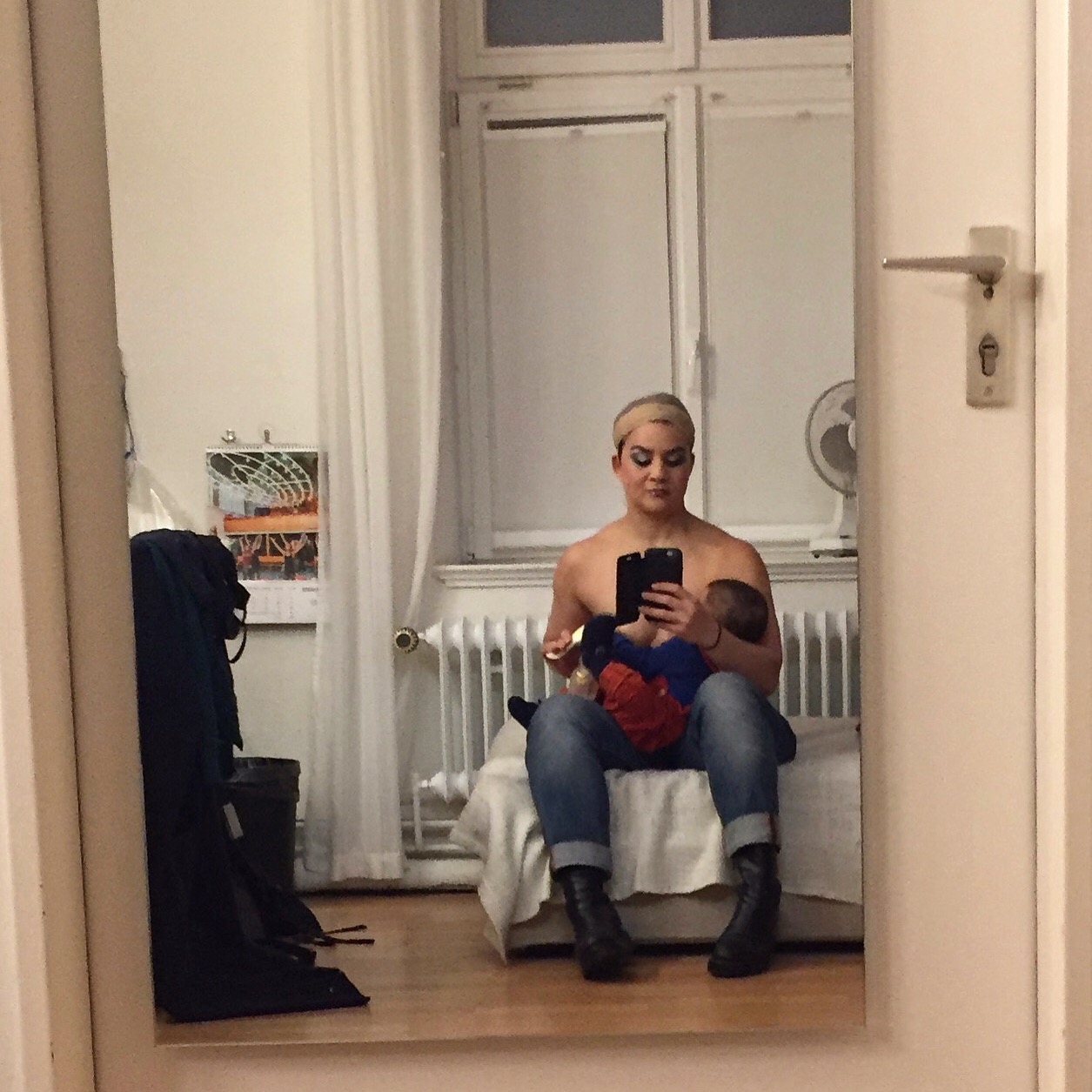
A selfie of Nina backstage at Hamburg Schauspielhaus, breastfeeding, pumping milk and learning a new text
Nina Wollny studied contemporary dance at the Rotterdam Dance Academy, now Codarts, in the Netherlands. After graduation in 2002 she joined the company anoukvandijk dc, working as dancer, rehearsal director and artistic assistant for over 10 years. Nina is a Master teacher of the Countertechnique, teaching at dance academies, companies and studios for professional dancers. From 2012, Nina has worked with different choreographers in Europe, regularly performing and collaborating with German choreographer Jenny Beyer. She is currently part of How to die-Inopiné by Mia Habib Productions and Resisting Extinction with the Body Cartography Project, both in Norway. Nina and I had our first interview in August 2019 when she was performing in Berlin and her daughter Ada was four months old. She spoke about the importance of not hiding as a mother in the dance field, returning to her physicality after birth for her mental health and advocated for dancers having more voice in how long to dance throughout pregnancy. Nina and I caught up over zoom in May 2020, to speak about the impact of the pandemic on working as a freelancer and being a parent, what being ‘local’ feels like and what it means to be a dancer now.
Katelyn: To begin could you speak about what you’re currently busy with? What is present for you?
Nina: I was really looking forward to our meeting because the interviews we’ve done in the past are really this moment where I can reflect on everything. They are kind of a time for me to put order or to understand what is going on because so much somehow has happened. Where do I even start?
Katelyn: Well, I would be curious to start really with what is happening right now and then maybe it will go back.
Nina: Yeah, that’s a good idea. Today I’m preparing a class to teach through a format similar to Praxis Oslo, which was started with some dancers from here. It’s about different practices, like a circus artist, an actress, different people sharing their movement practices or their training. You do not have to be a professional performer. So that was a really nice development. Something to do here that I do not think would have happened if we all would had kept on travelling like crazy. But because we are here more, suddenly there was a network formed. So that’s something I will do now once a week. I also join the classes, it’s kind of a community thing. I like to go there and then we meet and discuss what we do next. Then another thing, I have taught a certain way for the past 16 years and I am interested in exploring a different direction, that I have always been interested in and never had time to work on. One side is my interest on working with anatomy and really focusing on that. I found so many things that I want to do with that. Then another thing that has developed during the pandemic is about sex and gender. Just the fact that all the skeletons we see are male skeletons, it’s problematic. Then in March when Black Lives Matter happened, I was like, why have I never questioned that all of those images actually have light skin? I have been so obsessed about the pelvis but why do none of those images that I’m looking at have the skin color of my mother? There are many things I learned from anatomy and I love to use it. I think it is kind of magic to work with and it influences my dancing so strongly. It changes my presence. It changes my dance. It changes me. But then what about the fact that it is completely lacking diversity? What does it do to us? Also, the fact that is missing for the people who come to my classes or my workshops. I make sure that I at least show the female version of the pelvis. But there are many other things that are actually missing. So, I was busy with those things and I want to put more energy in them. And then coming to the situation with having a baby, I don’t want to travel that much anymore. The pandemic forced everyone, in the moment where I had to change my life, it forced everyone to change their lives with me. So, I am totally going to use that when “corona is over.” I cannot go back. I am a completely different person in this one year for many reasons.
Katelyn: You mentioned you’re a completely different person within this one year. Can you describe more what you mean by that?
Nina: Yeah, I think not a different person. It’s just that I’m different. I’m not the same as I was last year because we changed. And when people say, “when everything goes back to normal,” I think it doesn’t make sense. It’s like ‘Make America Great Again.’ And its people who understand why ‘Make America Great Again’ is messed up who actually say, “finally when everything is back to normal.” I don’t know if I want to see performances from a year ago, performed just exactly the same. Or I see TV things that are supposed to be now but they’re ignoring the fact that it’s a pandemic. It’s always a bit weird because why would you ignore it? It’s here now. It’s going to be like this. It will be forever with us.
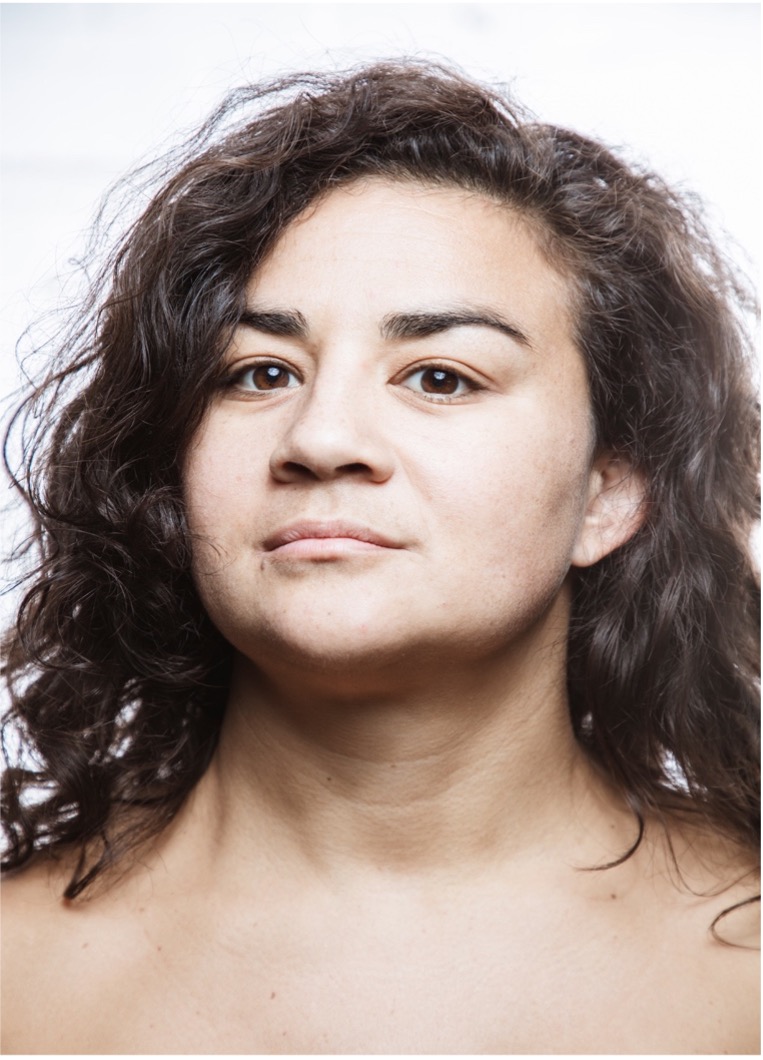
Nina 9 weeks pregnant Photo: c. Thies Rätzke
Katelyn: I remember talking to you before about how traveling and planning and all of these things were so much a part of your life and maybe even part of your identity. Was this transitional period challenging in any way?
Nina: It’s really extreme because I had never been in one place for more than two months before the pandemic and now it’s been a year. Staying in one place for so long is quite a change for me because even as a child we always moved somehow. So, it’s quite a big difference. But I really don’t mind it. I mean, I’m kind of happy. I really like the place where I am, and it started exactly in the moment when Ada was one years old. I mean, I had to make the change. I knew the whole time, even when I was saying, “everything is just the same.” But I knew. I knew that slowly I would have to make some kind of transition because living like before was not possible, but I didn’t know how. So, the fact is that I was forced to sit still and reconsider and everybody was with me. It was really in a way, helpful.
Katelyn: Do you feel that the shifts that keep coming, of trying new things etc., do you feel that they started in pregnancy and have continued through now?
Nina: Yeah, I’m not sure, I was really wondering about that. (long pause) I mean, it started in pregnancy, but I think the pandemic enhanced it. There are some things related to work I had questioned before, but I didn’t really make a change. And now I’m like, but why? Because I don’t want to carry stuff around with me that I’m not really sure about. Some people say that it reveals what’s already there, but it becomes clearer somehow. I feel that very strongly with a lot of things.
Katelyn: Motherhood reveals this?
Nina: No, actually, I meant the pandemic but maybe both do that. Yeah, it’s a combination. Motherhood, trying something new and also the pandemic being here. It’s very clear – if you don’t like something maybe you have to do something about it. It’s something about this radical reaction of the world. I’m not saying it was necessary, but I’ve never lived through a time where life had to stop like this. I could never imagine it and now we just did it. I didn’t know if I was going to work again and now, I actually earned more money than before, from the summer until now. So, I realized that this was kind of extreme and I never could have imagined it but now we did it and it’s actually possible. Somehow that makes it easier or takes away the fear or the hesitation.
Katelyn: Do you think skill sets and things that you obtained being a dancer also supported this time of having to adapt, of having to always be resilient in a way?
Nina: I don’t know if it’s specifically about dance but about the way that you work as a freelance dancer. I actually never worked in a company with a fixed contract. So, I never knew what would be happening next year, it just somehow continued. Now it’s almost 20 years. At some point you have this trust it’s going to be something. So now, getting a mortgage with my partner, it’s the first time that I really have to pay a certain amount every month. I am kind of nervous about that. But on the other hand, I really learned that somehow, the amount of work has always gotten more, so this kind of trust that I can figure it out. But also, the way that I had to figure it out was not always following the same things. Sometimes I made more radical decisions or new decisions or asked, what else can I do? That kind of thing you practice by just living that kind of life.
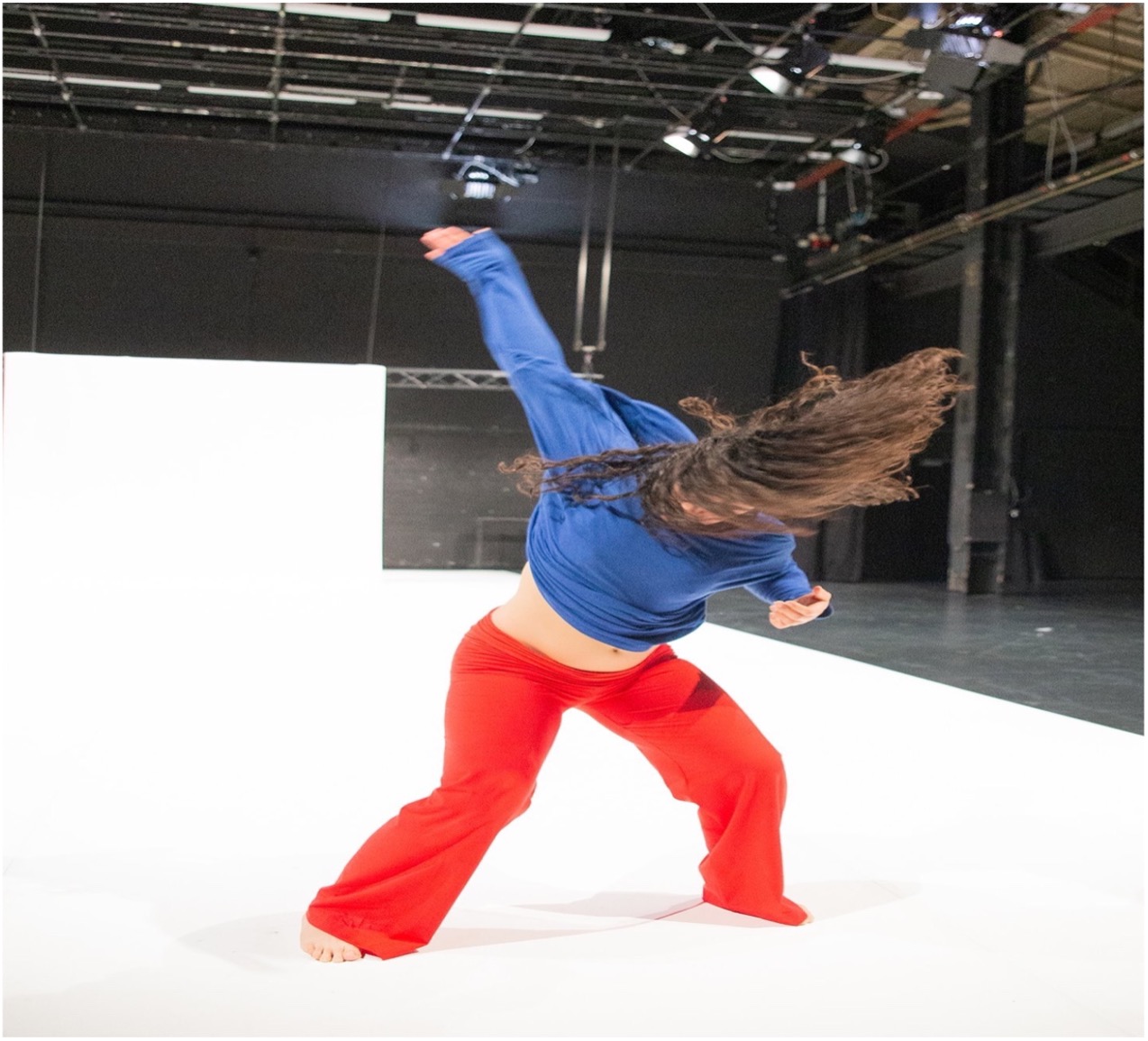
Nina 7 months pregnant in Debut by Jenny Beyer Productions Photo: c. Wolfgang Unger
Katelyn: What does it mean for you to be a dancer right now?
Nina: (pause) For me, it didn’t really change so much. It’s always been this big thing, learning about how the human body works. I just think we are all born as dancers and some of us use it more and some of us use it less. But that’s how I feel about being human. To fully appreciate the situation we are in and the potential we have, dance is the perfect way to access these moments in all their richness. The more I learned and realized that the happier I was that this gets to be my job. When I didn’t dance, in the beginning after she was born, I started to have these really depressed moments where I just was crying and didn’t know what was going on. And then I went for a run and realized, oh, I just need to move. And then I went for a dance class. For me it’s something about moving and travelling through space. So, in those moments with her, I realized that if I don’t have movement, I personally feel that I have a problem or I can’t solve my problems anymore or things start to hurt. I have to prioritize going to two classes a week to be able to just be healthy in a way. But it’s not so pandemic specific. That is the physical question and then there is also the question of being an artist. With that I am not always as articulate. I can strongly feel it in my body. There is this website in Germany where people posted, ‘Ohne Kunst und Kultur wirds still’ (without art and culture the world is silent). When I read that I’m sometimes wondering what people actually mean? So, I looked at that and thought about it myself. In a way, maybe it’s just that I just continue. I continue because I have to, and this is what we do. That there is this reflection made through our bodies and giving it back to the world is just a part of the world. It was somehow my job as a dancer to continue doing it and finding ways of doing it.
Katelyn: You mentioned earlier in relation to teaching and performance, online formats really working. That you’re able to find something useful and new. Could you describe some of those things in more detail?
Nina: For me, one of the things that came out of the piece Deux with Jenny Beyer was how to go deeper into the question of, what can we actually do with the genre? What is possible and what is not possible? One of the things that I learned there and also in teaching online classes, was to be present where you are. It is super obvious, but online when people are trying to figure out the steps and they go like this (gestures with arm) they leave their body and can’t dance, and they are stuck. They feel like they’re stuck in their room because the space is too small but it’s not. You’re stuck in your body because you’re not actually in your room. If you’re actually in your room, you can move quite big, no matter the space. So that’s one of the things that I really learned. You know bringing people to find out what agency they can take in using their body in their space. And then with that there came this idea, this big idea, of being local. You know, I always saw these, ‘be local act global,’ tags on walls. When I first saw them, I didn’t really know what it meant but it sounded good and I heard people that I liked use it, but I really didn’t understand it. Now, everyone here in Trondheim is really much more supportive of being local, because we are here, and we want to make it nice. I understand that now. I also realized that to connect and have an influence on all of those people on zoom, I have to make the decision to really being where I am and not try to be somewhere else. Moving the air where I am. The stronger I do that, the more I can shake up someone in L.A. who just woke up and joins my class. So, then it feels that teaching online has a bigger purpose.
Katelyn: Through everything, how have you managed your support systems?
Nina: Yeah, we’re not so good at it and trying to get better with it. We decided to live here because Alex’s (Nina’s partner) parents are here and it’s a good place to have a child. Then the pandemic came right when I started work again and Ada started to go to daycare. We were both working most of the time and then somebody would have to pick her up, either Alex or me. If she was sick, somebody would stay home. In the beginning, we didn’t even think about it. I think we’re just not so good at asking for help. And the reason why it didn’t come up so much is because you are not really supposed to see the grandparents with the pandemic. So, in a way, we try to do it all by ourselves. But we did have a day care system here that was open the whole time. So, we probably had more help than anyone in the pandemic. I’m also going to be traveling again more, so when Alex is alone with her, we will ask his mom to sometimes to pick her up. I have to say, being here, I had a rehearsal, and I could just bring her, or I left rehearsal early to pick her up. Also, with Jenny, you know, she knows herself how hard it is, so Ada was just there playing in the room and it worked really well. We had lots of different situations, but it has worked quite ok. So again, it has to do with working with people that are open for this kind of stuff. Basically, from the moment that I was pregnant, my focus went more to those people. Mia Habib, who I work with here is the same. When we work in Oslo, she has to pick up her daughter from daycare and she leaves to be there in time to pick her up. So, basically all the jobs I have right now, it feels like even if it’s a difficult moment, I never had this feeling like, oh, shit, what do I do now?
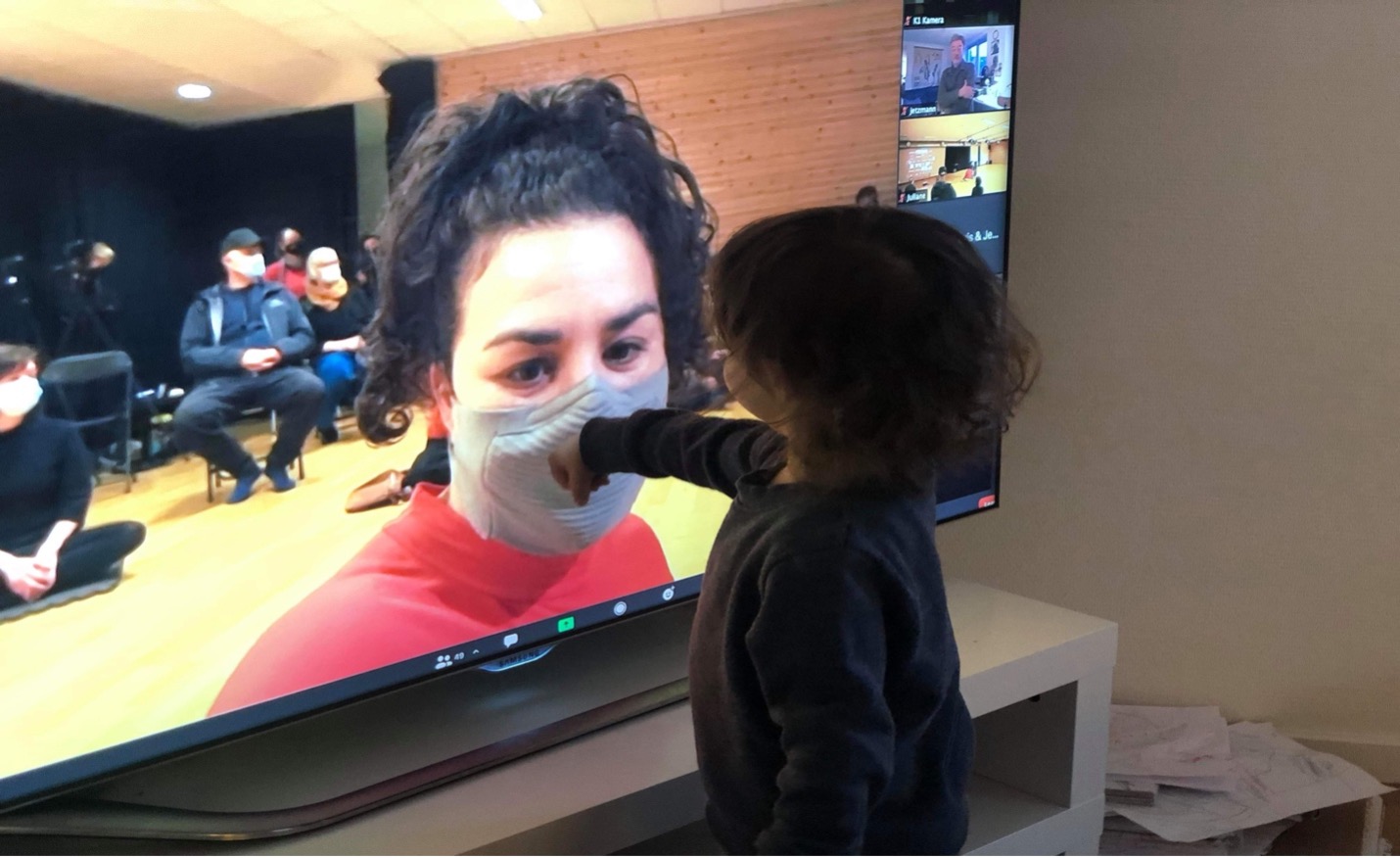
Photo of Nina and Ada taken by her partner Alex while watching Deux from home on Zoom
Katelyn: Do you think that all dance companies or projects could work on that schedule? Or do you think it’s only possible for certain types of work?
Nina: I think it’s just a schedule that is working together with day care. So, in other places, like in the Netherlands, for example, the daycare goes a bit longer because everything starts later. For people here it is just very clear that that is what daycare is for. So, it has to be coordinated in a way that it works for people. Apparently in Oslo, there is a day care place for actors specifically where they can actually go later. So, this coordination between the daycare system and how people work. It’s nice if there’s some kind of link. And then, of course, trying to take into account that not everybody works the same way.
Katelyn: You said that you’re going to be out of town coming up, what is that for?
Nina: Yeah. (Ada is there and she is talking to her) It’s almost nap time.
Katelyn: Ok
Nina: That’s actually something I wanted to talk about. Because I am still going to travel a bit again, so now trying to get ready for that. Last year we had the performance of How to Die and we worked in Oslo for a week before. So that was the first time since March that I was gone for two and a half weeks. It’s kind of hard because normally the moment the child goes to daycare, you can kind of start and let them get used to being with other people than their parents. But because of the whole situation, we didn’t want Ada to be alone so often with the grandparents and she didn’t have time to practice that. So, I feel that’s missing. From all of the things that went really well and have helped me to deal with this situation, that’s a bit missing. We’re kind of missing a year of learning how to deal with some travelling. So now I’m going to be away again for two weeks, working a little bit with Olive and Otto and then having a performance with Mia afterwards. So, it’s happening now and I’m getting all of these offers and I’m like how much do I want to do? How much can I do? It’s a bit hard right now because it’s the moment that everything is opening up and going back to normal. I’m a bit nervous about this. I don’t want to be gone for a month. Before I had this rule that I would not travel continuously without seeing Alex for longer than six weeks. I always kept it less than that. But I guess that’s a bit too much now. I also don’t think I want that anymore. I mean, I know I don’t want that anymore. So, I’m kind of curious to see how that will work out. I am preparing myself to be clear and find good solutions. I’m really not good at saying no to work. Also, now with the mortgage there is a little bit more pressure for the money. So, I am pushing myself a bit more to say yes to things because of the money. But it’s the same as a freelance dancer. How early do you fill up your calendar and then things that you really want to do come up and you have to say no. So, it’s not such a difference. But what I used to do, which was also stupid, was just not have weekends. I did that all the time to be able to fit things. For years I told myself travelling in the weekend is not a weekend. Because after six weeks you’re so tired and exhausted and get some kind of mental breakdown. But I just kept doing it. So, I hear myself talking now and I’m thinking it feels like new pressure but it’s exactly the same game as before. I just have to keep getting better at it like I practiced. And now I have better reasons. So maybe it helps.
Katelyn: Thank you so much. I’m curious to talk again in the future. It’s been so nice to be able to connect with you through these benchmarks of time.
Nina: It is good for me to have these moments of reflection. Ok, I guess now it’s nap time. (Ada is there breastfeeding) This breastfeeding thing, first of all, it is magic and great in those situations where you need some calm. She’s a bit sick today and it helps to keep the fever away. But actually, in the last week, she also really didn’t ask for it. So, I’m not worried that it’s going to be forever because she’s really at the moment where she is looking for other solutions herself. But today is one of those days where it actually makes sense. Maybe now when I come back after being gone for two weeks next month, she will be done. I don’t know. But for this moment, when I feel like I just want to finish to talk and she is kind of annoyed, the boobs are helpful.
(laughter)
Katelyn: Well, thank you very much and talk again soon.
Nina: (Ada is talking to Nina) Bye bye (they both wave bye)
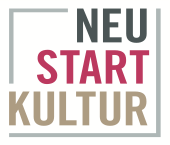
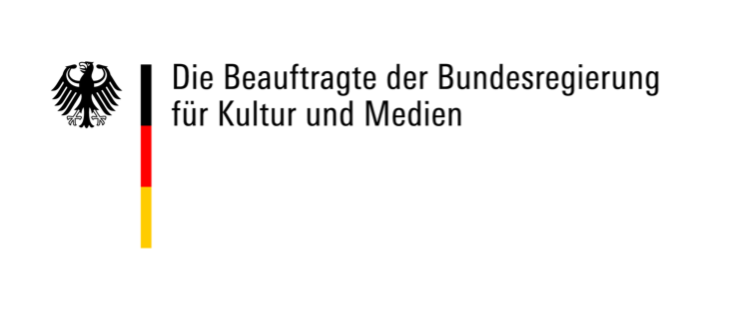

Gefördert durch die Beauftragte der Bundesregierung für Kultur und Medien im Programm NEUSTART KULTUR, Hilfsprogramm DIS-TANZEN des Dachverband Tanz Deutschland.
